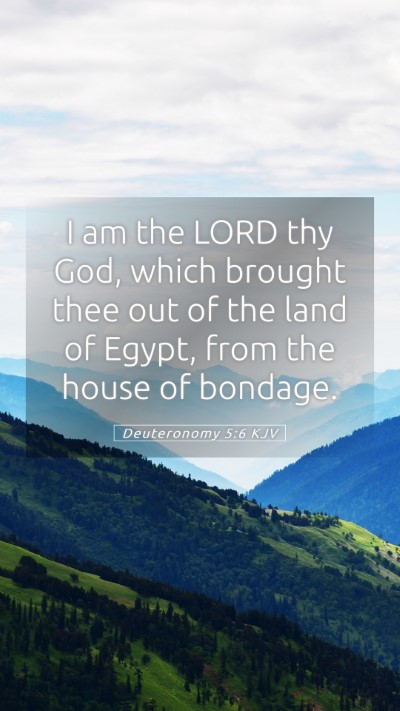Understanding Deuteronomy 5:6
In Deuteronomy 5:6, the verse reads: "I am the LORD thy God, which brought thee out of the land of Egypt, from the house of bondage." This verse is a powerful declaration of God's sovereignty and His role as liberator. It sets the tone for the Ten Commandments that follow, emphasizing the basis of the Israelites' relationship with God.
Context and Significance
Deuteronomy is a reiteration of the Law given to the Israelites, intended to remind them of their covenant with God as they prepare to enter the Promised Land. This verse specifically serves to remind the people of God's past actions—delivering them from slavery in Egypt—and His ongoing authority as their God.
Biblical Exegesis and Commentary
-
Matthew Henry's Commentary:
Henry emphasizes the importance of acknowledging God’s authority and the grace shown in their deliverance from Egypt. He notes that this recognition is foundational for obedience and worship, correlating the act of remembering deliverance with ongoing fidelity to God’s commands.
-
Albert Barnes' Commentary:
Barnes highlights that this proclamation signifies a personal relationship between God and His people. He points out that remembering God's act of salvation should foster a deeper commitment to following His laws, framing their obedience as a response to His grace and mercy.
-
Adam Clarke's Commentary:
Clarke notes the significance of the term "LORD" (Yahweh) and its implications as not just a title but a declaration of God’s eternal existence and covenant relationship. He elaborates on the historical context, indicating this remembrance serves to instill a sense of identity among the Israelites as they navigate their new life in the Promised Land.
Theological Insights
This verse encapsulates the essence of the narrative of salvation throughout Scripture. It reminds believers today of God's power to save and the importance of recognizing how that power has manifested in their own lives. The deliverance from Egypt is seen as a type of spiritual salvation, foreshadowing the ultimate redemption found in Jesus Christ.
Application in Life
For modern readers, Deuteronomy 5:6 calls us to reflect on our own pasts and recognize the acts of God that have liberated us from sin and spiritual bondage. This prompts individuals to live in gratitude and obedience to God's commands. The verse serves as a challenge to actively remember God’s goodness, which can lead to a lifestyle characterized by worship and trust.
Cross References
- Exodus 20:2: "I am the LORD thy God, which have brought thee out of the land of Egypt, out of the house of bondage."
- Deuteronomy 6:12: "Then beware lest you forget the LORD, who brought you out of the land of Egypt, out of the house of bondage."
- Psalms 81:10: "I am the LORD your God, who brought you up from the land of Egypt; open your mouth wide, and I will fill it."
Conclusion
The simple declaration of God in Deuteronomy 5:6 carries profound implications for understanding Scripture, biblical exegesis, and daily application. As believers seek to explore the meanings of Bible verses and interpretations, they will find that the foundational truths presented here echo throughout both the Old and New Testaments.


